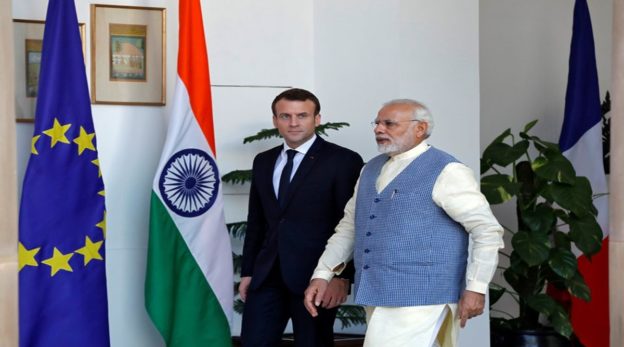India looks at France as a ‘trusted’ partner in countering myriad security challenges from the seabed to space and from cyber to oceans.
Prime Minister Modi is embarking on his first foreign visit this year to Germany, Denmark with a brief stopover in France on 4 May. This will be his 4th visit to France since 2015 and could not come at a more opportune time with Emmanuel Macron’s re-election as French President and amid the Ukraine conflict. There has been a growing bonhomie between the two nations backed by the personal equation between Modi and Macron that further helps in cementing the strategic partnership – the first ever such partnership that India signed with any country during the visit by President Jacques Chirac in 1998.
This multidimensional partnership is spread across several avenues of cooperation: civilian nuclear power, defence, trade and investment, transport, counter-terrorism, space, cybersecurity and digital. For India, France has been a reliable partner since decades. It was the only western nation not to condemn India’s nuclear tests in the 90s. It was one of the first countries to support India’s candidacy at the UN for the permanent seat at the Security Council. Of late France supported India’s stand on Kashmir, while it backed the UNSC resolution sanctioning Pakistani terrorist Masood Azhar as well as stronger FATF sanctions against Pakistan. More recently both nations have extended their common interests in the Indo-Pacific with France identifying India as one its core Indo-Pacific partners and major players in the region.
Over the years India’s defence cooperation with France has increased with the latter becoming India’s 2nd largest arms supplier (after Russia). The supply of Rafael jets to India in the midst of the Galwan crisis and the growing avenues of further cooperation in security and intelligence sharing with each other is a signal of mutual trust and confidence in their relationship. On 20th April, the sixth and last of the Indian Navy’s Scorpene-class submarine was launched, built by France’s Naval Group in collaboration with Mazagon Dock Shipbuilders Limited (MDL). There is now a possibility of France offering its Barracuda nuclear attack submarine for the Indian Navy’s Project 75 Alpha during French Defence Minister Florence Parly’s visit to New Delhi in December last year. This signalling comes in the background of Australia abruptly cancelling the 90 billion dollar diesel-powered submarine deal with France and instead choosing to pursue a nuclear-powered submarine option under the newly formed AUKUS (Australia, UK, and US) partnership. Regardless of the fact that this was a major setback for France, analysts believe that it was a positive thing for India’s defence industry. Recently held 20th edition of ‘Varuna’ – a five-day naval wargame exercise between the two countries in the Arabian Sea is a reflection of growing congruence in their maritime security cooperation. As Jaishankar commented, India looks at France as a ‘trusted’ partner in countering myriad security challenges from the seabed to space and from cyber to oceans.
The ongoing Ukraine conflict does create a difference in opinion and posturing that India and France (and EU nations) have on tackling Russian intervention. With India taking a more neutral approach commensurate with its foreign policy of non-alignment. There is nevertheless an implicit understanding of India’s stance and its strategic compulsions vis-a-vis Russia. In these challenging circumstances, French IT Company Atos recently moved some of its Russian business to India in order to deliver critical digital services to some of its global clients. This creates opportunities for India as it may emerge as an important FDI destination for French companies planning to diversify. This view was echoed by Franck Riester, French minister for foreign trade in March suggesting that India will play a key part as Europe and France seek to diversify their supply chains in the backdrop of the Covid-19 and sanctions imposed on Russia in recent weeks.
The economic and trade partnership between the two is also on rise. Recent visit by European Commission President Ursula von der Leyen to New Delhi gave further impetus to the ambitious India-EU free trade agreement set to be concluded by 2024. France as the current President of the Council of the EU is pushing that target. This will inevitably boost investment flows between France and India. From January to December 2021, the India-France bilateral trade in goods (excluding military equipment) stood at $13.3 billion (+39.17% as compared to the corresponding period the previous year). India’s exports to France were valued at $7.1 billion, up by 39.36% during this period. Indian imports from France also increased by 38.98% to $6.2 billion. Nonetheless, there is a huge scope of greater cooperation in areas such as innovation, education, renewable energy and tech sector. There are more than 1,000 French establishments already present in India employing around 300,000 persons with a turnover of more than USD 20 billion. France has a cumulative investment of USD 10.06 billion from April 2000 to December 2021. Simultaneously there are around 200 subsidiaries of Indian businesses established in France.
As India and France celebrate the 75 years of their diplomatic relations. PM Modi’s visit is scheduled at an appropriate time to further consolidate their bilateral relations and unlock wider areas of cooperation to meet the challenges of the global economy.
https://www.financialexpress.com/defence/pm-modis-visit-to-paris-set-to-reinforce-indo-french-ties/2509028/





